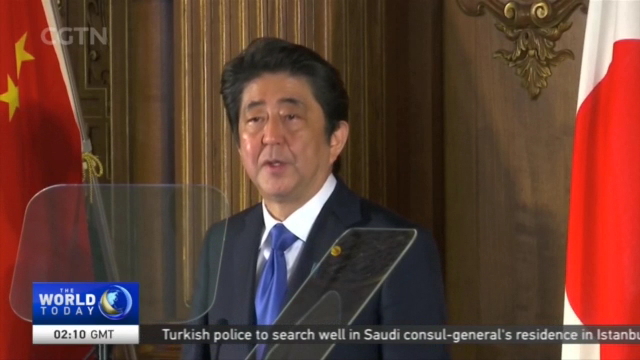
10:50, 25-Oct-2018
China-Japan Ties: Japanese PM Abe gears up for three-day visit to Beijing
Updated
10:35, 28-Oct-2018
02:36

Later today, Japanese Prime Minister Shinzo Abe will begin a three-day visit to China. Japanese experts say, that as Abe enters his last term in office, the veteran statesman will look to lay a firm foundation for the future of relations with China. Our Tokyo correspondent Terrence Terashima has more.
Japanese Prime Minister Shinzo Abe and Chinese President Xi Jinping will certainly have a plate full of issues to discuss when they sit down for talks in the Chinese capital. Given the rapidly changing situation on a wide range of issues such as trade and regional security to technology and currency exchange, this hardly comes as a surprise.
Japanese experts say that as Abe enters his last term in office, the veteran statesman will look to lay a firm foundation for Sino-Japanese relations in the years to come and build a lasting diplomatic legacy by accelerating regional security coordination and trade.
But Abe finds himself in a challenging position. Washington-Japan's traditional ally - seems determined to take a stance of strategic competition with China both in security and economic affairs.
PROFESSOR KEN JIMBO FACULTY OF POLICY MANAGEMENT, KEIO UNIVERSITY "Japan might be joining such a strategic competition in the security field and it's been there for many years. But on the economy, Japan is fully inter-dependent with China and our business community is not in the same line with what the United States government and also the business community try to see China."
In earlier meetings, both leaders agreed that stability in the East-China Sea is crucial to the bilateral relationship. Security in the Indo-Pacific region will also be vital to ensuring the safety of both China and Japan's regional investments.
PROFESSOR KEN JIMBO FACULTY OF POLICY MANAGEMENT, KEIO UNIVERSITY "We find areas of competition with China with their concept of Belt and Road Initiatives. But at the same time I think the Japanese government is trying to seek for the area where the Japanese companies and the Chinese companies can collaborate together as well as Japanese and Chinese official investments could make a force multiplier effect on those areas."
TERRENCE TERASHIMA TOKYO "One area that Shinzo Abe will be keen to focus on is the DPRK. Japan finds itself somewhat left behind in negotiations around denuclearization and the release of Prisoners – both topics of great importance to the Japanese public. Terrence Terashima, CGTN Tokyo."

SITEMAP
Copyright © 2018 CGTN. Beijing ICP prepared NO.16065310-3
Copyright © 2018 CGTN. Beijing ICP prepared NO.16065310-3